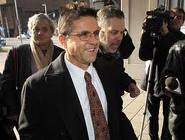
"The Amanda Knox debacle has shown us how easy it is for an injustice to occur when forensic evidence plays a critical role in a foreign jurisprudence. (Yes, she and her co-accused were finally freed – but only after for horrible years behind bars in a foreign country, cut off from their friends and families, and facing the possibility of many more years in prison.)
The difference between the Knox and Diab cases is that Canada is in a position to avoid the danger of a wrongful conviction by exercising its political authority not to ship Diab off to France to stand trial."
-----------------------------------------------------------------
PUBLISHER'S VIEW;
Revelations of the terribly flawed DNA evidence used by Italian police to connect Amanda Knox to the murder of her roommate impact strongly on another potential wrongful conviction on foreign soil: Efforts by the French government to have Canada extradite Professor Hassan Diab to face charges of murder and attempted murder in connection with the deadly bombing outside a Paris synagogue in 1980.
Hassan Diab is a Lebanese-born Canadian who taught sociology at the University of Ottawa and Carleton University.
As the Canadian Broadcasting Corporation reported in its story of Judge Robert Belanger’s decision to approve the extradition order on June 5, 2011, “ France alleges that Diab France alleges Diab was a member of the Popular Front for the Liberation of Palestine who made and planted a bomb that killed four people and injured more than 40 others on Oct. 3, 1980, outside the Copernic Street synagogue in Paris. But Diab insists his case is one of mistaken identity.”
Although Stamps in Diab's 1980 passport indicated he was not in France at the time of the bombing. The French government alleges that Diab’s handwriting appears on a hotel registration card — evidence his lawyers have contradicted through a trio of highly regarded defence handwriting experts.
It is notable that although Judge Maranger admitted the disputed French expert evidence, he likened handwriting to a “pseudo-science” and described the critical French handwriting analysis as “problematic”, “very confusing”, and with “suspect” conclusions. (Toronto Sun: February 18, 2011.
Moreover, when Maranger ruled in June that he had no choice but to extradite Diab under Canada’s extradition treaty with France, he also noted that France had presented a “weak case” that is “unlikely” to result in a conviction.
The Amanda Knox debacle has shown us how easy it is for an injustice to occur when forensic evidence plays a critical role in a foreign jurisprudence. (Yes, she and her co-accused were finally freed – but only after for horrible years behind bars in a foreign country, cut off from their friends and families, and facing the possibility of many more years in prison.)
The difference between the Knox and Diab cases is that Canada is in a position to avoid the danger of a wrongful conviction by exercising its political authority not to ship Diab off to France to stand trial.
I urge Justice Minister Rob Nicholson to stand up for justice in the case of Hassan Diab: Do not put him to the risk of trial in France on such flimsy forensic “evidence" - on such a weak case.
Do not put him in the same position as Amanda Knox;
HAROLD LEVY: PUBLISHER; THE CHARLES SMITH BLOG;
--------------------------------------------------------------------------------
PUBLISHER'S NOTE: The Toronto Star, my previous employer for more than twenty incredible years, has put considerable effort into exposing the harm caused by Dr. Charles Smith and his protectors - and into pushing for reform of Ontario's forensic pediatric pathology system. The Star has a "topic" section which focuses on recent stories related to Dr. Charles Smith. It can be found at:
http://www.thestar.com/topic/charlessmith
Information on "The Charles Smith Blog Award"- and its nomination process - can be found at:
http://smithforensic.blogspot.com/2011/05/charles-smith-blog-award-nominations.html
Harold Levy: Publisher; The Charles Smith Blog; hlevy15@gmail.com;
